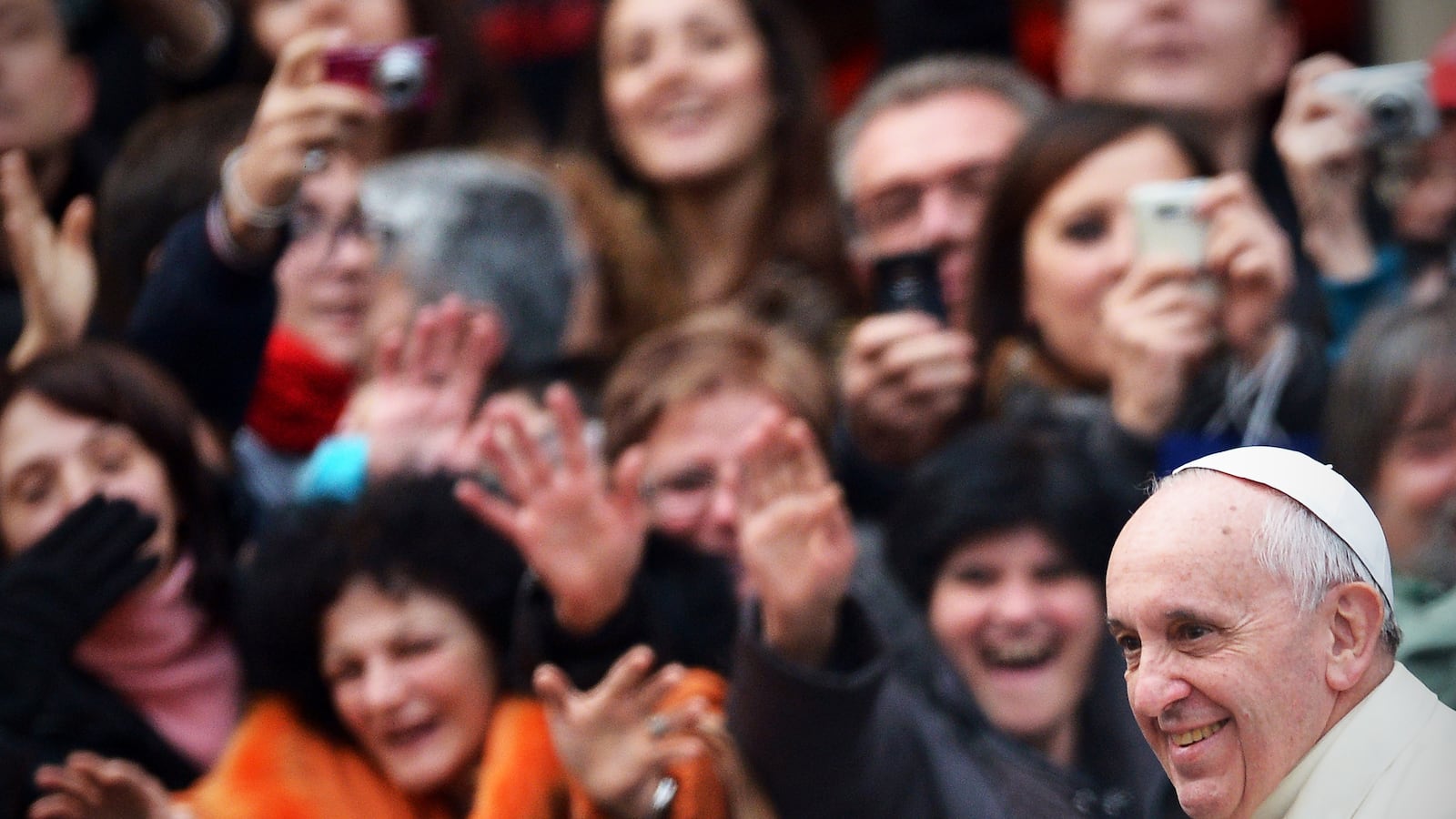Pope Francis is undoubtedly a good guy. In his first nine months at the helm of the Catholic Church, he has managed to impress almost everyone. His human touch has earned him Time Magazine’s “Person of the Year” honor; his shocking comment “If someone is gay and seeks the Lord with good will, who am I to judge?” when asked about gay priests even earned him Advocate magazine’s person of the year. He is even featured in caricature on this week’s New Yorker cover making a snow angel. But for all the papal cheerleading, there is still at least one demographic that won’t be lauding the great pontiff quite yet: women.

During an exclusive interview with La Stampa newspaper last week, the pope flatly ruled out the possibility of women ever ascending to any leadership position equal to men within the Catholic Church’s hierarchy. Ever. Answering Vatican expert Andrea Tornielli’s question about whether or not Francis’s Church would ever see female cardinals, the much-loved pontiff scoffed, “I don’t know where this idea sprang from. Women in the Church must be valued, not clericalized. Whoever thinks of women as cardinals suffers a bit from clericalism.”
This is not the first time Francis has seemingly dismissed women as equals, keeping in line with his predecessors’ views that women are somehow lesser creatures. In a September interview with a group of Jesuit magazines, including America, Francis said that it was necessary to expand opportunities for a stronger presence of women in the church, but he clearly doesn’t want them behind the altar. “I am wary of a solution that can be reduced to a kind of ‘female machismo,’ because a woman has a different make-up than a man. But what I hear about the role of women is often inspired by an ideology of machismo,” he said.
Francis’s apparent disinterest in creating a church where women can be part of the highest ranks of leadership is troubling to many Catholics. Jon O’Brien, head of Catholics for Choice, told The Daily Beast that Francis is doing a great job on many issues. “There is absolutely no doubt that among rank and file Catholics, Pope Francis offers hope that things could change in the church,” he told The Daily Beast. “But when it comes to women, this pope, like past popes, has a blind spot.”
O’Brien says the pope is missing a golden opportunity to include women in his reforms. By marginalizing women as spectators or caretakers when it comes to hot-button issues like social justice, he is missing a vital voice. “It’s almost like women can wait while he takes care of more important issues,” says O’Brien. “It is a shortsighted approach.”
O’Brien and many other Catholics hoping for more equality in their church are particularly bothered by Francis’s statements on women needing what he called a separate theology. In the September interview with the Jesuit publications, he said, “We have to work harder to develop a profound theology of the woman. Only by making this step will it be possible to better reflect on their function within the church. The feminine genius is needed wherever we make important decisions. The challenge today is this: to think about the specific place of women also in those places where the authority of the church is exercised for various areas of the church.” O’Brien argues that the statement is not about seeing women as equals. “Theology of people should include women,” he says. “The idea that the Church needs a separate theology for women is plain condescending.”
Last April, Pope Francis affirmed his predecessor’s crackdown on American nuns whose orders are under the umbrella group known as the Leadership Conference of Women Religious. The group, which represents some 80 percent of all American women religious, was scorned in April 2012 for pushing so-called “radical feminist themes incompatible with the Catholic faith” by not staying silent on the Vatican’s favorite topics like birth control, same-sex marriage and euthanasia. And when Francis made his first significant changes within the Vatican’s Congregation for Bishops last week, he replaced two ultra-conservative bishops with moderates, but he left Cardinal William Levada, who authored the original condemnation against American nuns, in place.
Sister Joan Chittister, writing in the National Catholic Reporter questions whether women will ever be taken seriously in the Catholic Church. She says that the role of women isn’t even addressed as one of the top 39 areas of concern listed in a recent Vatican survey, which was lauded by many Francis supporters as ground-breaking. She worries that Francis insistence to separate women and label them as nurturers and mothers does little for the idea of change beyond rhetoric. “The pope’s recent statement on women to a meeting of the Women’s Section of the Pontifical Council for Laity in Rome concentrated almost entirely on women’s maternity, which occupies—at best—about 20 years of a woman’s life,” she says. “Most modern women, demographic data indicates, live at least another 35 to 40 years after the youngest child leaves home. And after that? What is her role then? Is maternity her only value, her perpetual definition? What does she do now with her personal talents, her insights, her gifts that, they tell us, are given for the sake of the world?”
O’Brien agrees. “What Francis has done has helped us [Catholics] refocus,” he says. “But we still have a whole half of the Church who have been neglected and forgotten. When it comes to women, Pope Francis needs some study. ”






